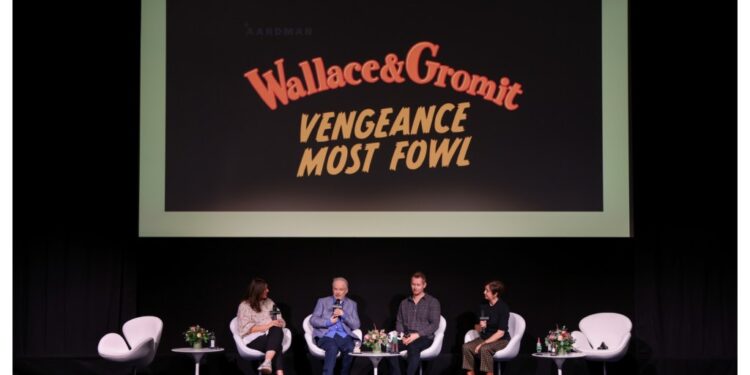Wallace & Gromit: Vengeance Most Fowl executive producer Carla Shelley is promising an emotional comeback for Aardman’s stop motion heroes as they return this winter in feature film format for the first time in nearly 20 years.
“I think we’re going to make everybody cry. We’re going to surprise everybody and make you laugh as well. It’s really emotional. That’s what’s at the heart of it,” Shelley told Deadline’s Contenders London event on Saturday.
She was joined on stage by co-directors Nick Park and Merlin Crossingham, who revealed they had completed post-production the day before.
In their new big screen appearance, Wallace and Gromit’s friendship is put to the test by the former’s invention of a smart gnome called Norbot, who takes on a life of his own, wreaking havoc in the process.
The movie, which launches on the BBC in the UK and on Netflix worldwide this winter, is only the second Wallace & Gromit feature after 2005 The Curse of the Were-Rabbit, although Aardman has continued to work with the characters in short films and video games.
Nearly two decades after the original, Park said Wallace’s obsession with gadgets has taken on fresh resonance in a tech-obsessed world.
“Wallace is well meaning. He’s not a bad guy, but it’s kind of a metaphor for how we’re in love with tech and sometimes it gets in the way of relationships. Gromit would be a lot happier without the tech, inventions and gadgets.”
Park also addressed the revival of evil penguin Feathers McGraw, who featured in his 1993 Aardman short The Wrong Trousers.
“The idea of McGraw coming back in was a slightly later breaking idea,” said Park. “Just machines going wrong seemed a bit normal. We needed something with a bit more bite, and someone with an actual clear, sinister motive. Feathers McGraw was obviously the perfect candidate, having sat in jail for 30 years, languishing, thinking of nothing but revenge. It seemed like the perfect motivation for a villain.”
Shelley described the idea of bringing back Feathers McGraw as a breakthrough moment.
“When Nick shared with the rest of us in the studio that Wallace was inventing a smart gnome, we all got quite excited. A little later on in the process, when he revealed that Feathers was going to come back, the whole room got chills.”
While animation techniques have advanced over the last 20 years, Crossingham said the production had remained true to the stop motion techniques of the original film.
“The heart and soul of it hasn’t changed at all. The technique is exactly the same as it always was. Move it, take a frame. Move it, take it frame,” he explained.
“We really tried to shoot as much as possible in front of the camera. It was only if we couldn’t do that, that we looked at alternatives that were appropriate to tell the story,” he addded.
A big development was that the team could review images immediately and could also add effects like water, particle effects, steam and smoke.
“All of those kind of things in stop motion are just nigh on impossible to do with any sort of elegance. So that’s where the technological side of visual effects has really come on to a point where we can embed it into stop motion in a way that feels appropriate to the Wallace & Gromit world, which is kind of chunky. Visual effects have struggled with that in the past.”
Crossingham talked about more subtle technological changes in terms of the inner mechanics of the figurines and the materials from which the puppets are made.
“There are things you won’t see, like [the use of] silicon, really geeky things,” he said. “Wallace’s trousers used to be made from modelling clay, then latex. We always liked the idea of using silicon, but you could get the silicon to look good, but it wouldn’t move. Or you could get it to move but it wouldn’t look good. In the last couple of years, that’s changed… so you can still see the fingerprints and it moves.”






